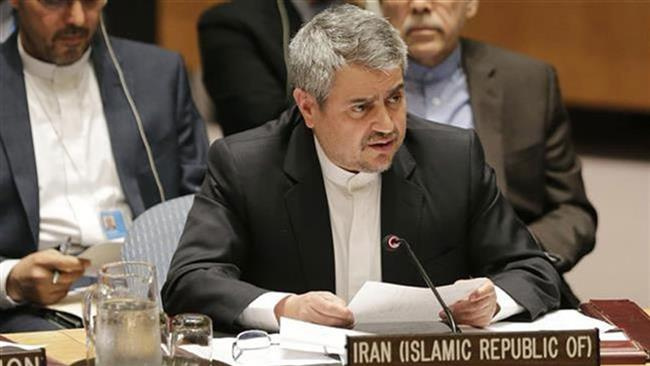Europe Stays in Nuclear Deal to Secure Its Interests

US’ President Donald Trump has announced his administration’s strategy against Iran, saying he would not certify Iran’s compliance with the nuclear deal and that there would be pressures and sanctions. How do you evaluate his remarks and the strategy itself? What is he looking for?
His remarks can be interpreted as a more explicit sequel to US’ constant hostilities against Iranians since the Islamic Revolution. Hostility with Iran is an indispensable part of US’ foreign policy, as passed into numerous legislations and executive orders. Over the past 4 decades, the US has continued its sanctions against Iran in full force. In other words, the new US administration’s strategy has nothing new. The US wants to reinvigorate its policy of Iranophobia, which was undermined with the nuclear agreement. The US is seriously concerned with the international community’s shift toward Iran and the country’s increased economic and military power. The backlash caused by the US President’s remarks indicated that in doing so the US has never been so alone. US leaders are well aware that the nuclear deal cannot be renegotiated or subject to new conditions unilaterally. The declared policy against the nuclear deal is driven on the one hand by domestic political rivalry in the US and used on the other hand to cover the country’s failure to comply with its commitments under the deal.
Trump has left decision-making on leaving or staying in the deal to the Congress. Can this be considered a withdrawal from his previous position?
That he repeatedly threatened to tear up the deal but has now left the decision to the Congress is meaningful. Most leaders and elites in the US and Europe have supported the deal and cornered him. Even in his administration, few members advocate leaving the deal.
How effective has been the preparation of the deal with strong principles in limiting US options in leaving it or put more pressure on Iran?
The nuclear deal results from two years of constant, exhausting talks between Iran and the six world powers. Many experts from all the sides worked on it. The main point is that Iran has been faithful to its commitments and the International Atomic Energy Agency, the only authority in confirming Iran’s compliance, has confirmed that in eight reports. Therefore, Trump cannot easily find a pretext to walk away. Today, all the signatories to the deal confirm Iran’s compliance, with the exception of the US. They want the deal to remain in place, warning the US of unilateral mistakes.
Will the Congress vote to leave the deal?
The Congress has never been so confused and entangled in partisan differences. Some lawmakers advocate the deal while others want a modified version. There are still others who want to incorporate non-nuclear issues into the agreement. As far as Iran is concerned, no change in the deal, be it from the Congress or from the US administration, is acceptable. The US has vowed to implement the deal with goodwill. Any proposition for renewed talks or annexation of new conditions is a unilateral breach of the UN Security Council resolution.
To what extent are Trump’s remarks under the influence and pressure of Saudi Arabia and Israel?
There is no doubt in Trump’s close ties with Netanyahu. However, during his campaign Trump repeatedly criticized the Saudis, who bribed him later. Of course, interwoven interests of the Saudi Arabia and the Zionist regime and their cooperation have played a major role in provoking Trump.
Immediately after Trump announced his Iran strategy, Federica Mogherini gave a speech in response. Leaders of Germany, France, and the UK also issued a statement in criticism of the US’ president’s remarks, supporting the nuclear deal. How far do you think Iran could trust the Europeans and hope they will remain in the deal? How far will they defy the US?
Relations in the international system are defined based on mutual interests, not trust. Neither Europe nor any single country is more sympathetic to our interests than us. Sure, Europe and others pursue their own interests. All international actors pursue their own interests and the truth is Europe’s interests lie in preserving the deal. Their support for the deal is not intended to satisfy Iran but driven by their understanding of the deal’s impact on regional and international peace and security. It is in here that the interests of Iran, Europe, Russia, China, and others are intertwined. However, the Trump administration has chosen an unorthodox path of isolation. The Trump administration considers itself entitled to special privileges and demands ransoms.
What are Iran’s practical plans to neutralize US pressure and sanctions?
Iran’s biggest stock in the international scene is to attract global trust and to keep promises. Iran is a powerful country, able to defend itself alone. It has insisted on its own principles and has negotiated with others, while preserving its dignity. The US administration has never been so isolated in the world. This is the fruit of Iran’s successful diplomacy, which is to continue.
The US’ Secretary of State Rex Tillerson said he had informed his Iranian counterpart Javad Zarif of the United States’ new Iran strategy on the sidelines of the general assembly of the United Nations. Iran has denied the claim. What happened between the two sides? Did the Americans discuss their strategy when the foreign ministers of the JCPOA signatories met? How did Iran react?
There was no bilateral meeting between the two foreign ministers. They only expressed their views during the joint meeting, where every side except for the US backed Iran and the deal. The Secretary of State did nothing but to bring up repetitive claims, resulting from political frustration and differences within the US administration.

